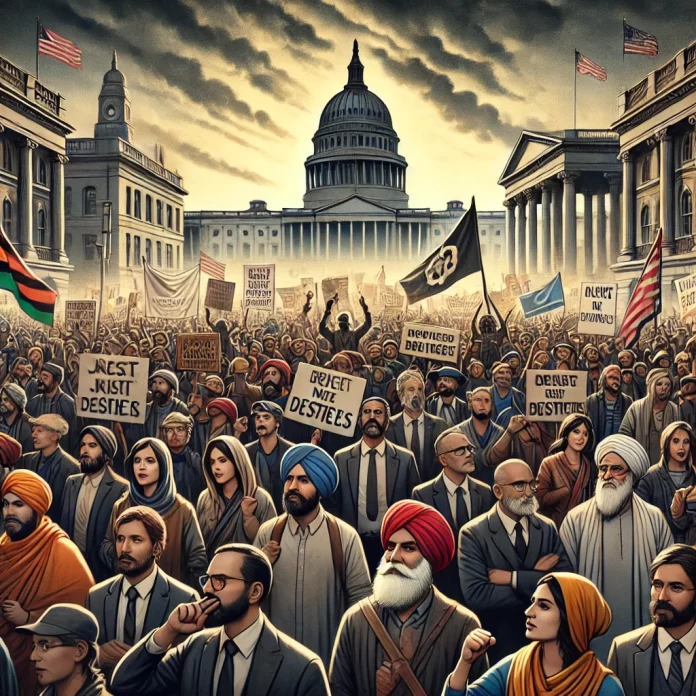The United States’ crackdown on political activism among Green Card holders and foreign students could have significant consequences for the anti-India Khalistani movement.
The Trump administration’s zero-tolerance policy towards individuals deemed supportive of terrorism or extremist ideologies places increased pressure on groups advocating separatism, including those linked to the Khalistani cause.
Investigations done by the Punjab police and premier Indian agencies have revealed that the separatist anti-India groups like the Khalistani outfits were radicalizing international Indian students, from Punjab in particular. The gullible youths were being asked to join protests to spread the separatist agenda and create hatred among various communities in the US, UK, and Canada.
Increased Scrutiny on Khalistani Activists
Khalistani activists in the U.S. have long used their residency and student status to mobilize support, raise funds, and organize protests against the Indian government. However, with the administration’s latest stance, individuals associated with radical elements of the movement may find themselves under heightened surveillance.
U.S. officials have reiterated that non-citizens engaging in political activism that aligns with foreign extremist agendas could face visa revocations, deportations, and potential legal action. “We are closely monitoring groups that seek to exploit their status in the U.S. to advance violent or separatist agendas abroad,” a senior Department of Homeland Security official told The Washington Post. “Any association with organizations linked to terrorism will have consequences.”
Fear of Visa Cancellations and Deportations
Several Khalistani activists in the U.S. hold Green Cards or student visas, and their involvement in demonstrations and political campaigns against India may now carry significant risks. Immigration experts warn that even indirect associations with groups suspected of supporting extremism could result in visa cancellations or deportation proceedings.
“The government’s broad interpretation of security risks means that individuals engaging in Khalistani activism could be caught in legal gray areas,” said David Bier, an immigration policy expert at the Cato Institute. “This could discourage participation in movements that have historically found support among certain diaspora groups.”
Shift in U.S.-India Relations
The crackdown also signals a shift in the U.S. approach toward movements India considers a threat to national security. New Delhi has repeatedly urged Washington to take a stricter stance on Khalistani separatists operating from American soil. Indian diplomats have lobbied for more significant restrictions on groups that promote anti-India rhetoric under the guise of free speech.
Analysts believe Washington may be more receptive to India’s concerns with the U.S. now emphasizing national security and counterterrorism measures. “The U.S.-India strategic partnership has deepened in recent years,” said Aparna Pande, a South Asia expert at the Hudson Institute. “The Trump administration’s policy shift could result in stronger cooperation against separatist movements that threaten India’s sovereignty.”
Impact on Diaspora Organizations
Many pro-Khalistani organizations in the U.S. rely on the legal protections of free speech to advocate for their cause. However, the latest policies create uncertainty over what constitutes permissible activism.
Gurpatwant Singh Pannun, legal advisor to Sikhs for Justice (SFJ), has previously claimed that his group’s advocacy is peaceful. “We are exercising our democratic rights to seek a referendum on Punjab’s independence,” Pannun said in an interview with The New York Times. “Criminalizing political activism undermines the very freedoms America stands for.”
Still, with the U.S. signaling a more rigid approach to foreign political movements with perceived extremist links, groups such as SFJ may face legal hurdles.
Future of the Movement in the U.S.
The crackdown is expected to have a chilling effect on Khalistani activism in America. Potential visa restrictions and deportations could limit the movement’s ability to mobilize on U.S. soil. Activists may become more cautious in their activities, fearing legal repercussions.
Meanwhile, India is likely to welcome the policy shift as a win in its ongoing effort to curb Khalistani separatism abroad. The coming months will determine whether these measures lead to a broader decline in the movement or force it to adapt to new challenges in the U.S. political landscape.

